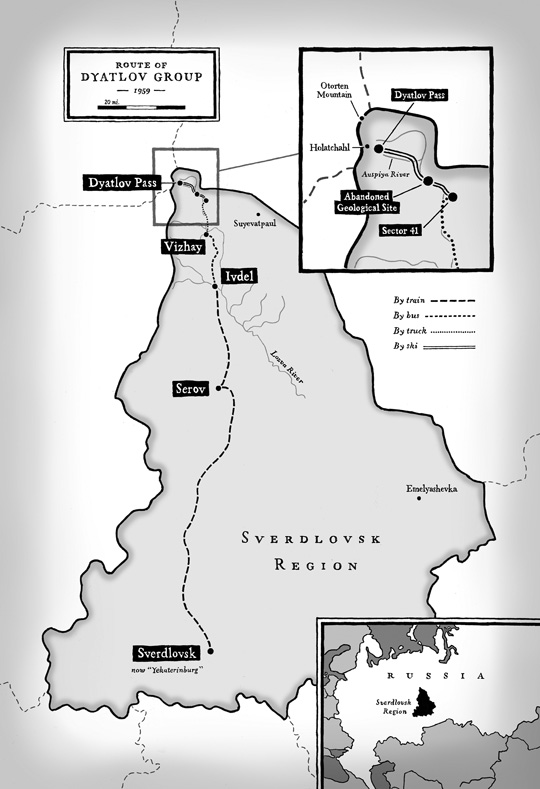
A nice map of the expedition, reproduced from here.
The group’s diary was found in the tent. It is fairly short, but contains entries from many of the group’s participants. As a document of the incident it is simultaneously charming and troubling, and especially interesting because it allows us to follow in the group’s footsteps. While it doesn’t take us up the slopes of Otorten, it gives us a valuable glimpse of the first few days of the expedition, as well as the character of the members of the Dyatlov party. I’m quoting from the site mentioned in the last section; Teddy has apparently done the English translation herself. I’ve edited some selections very lightly for readability, indicating with brackets where I’ve done so.
The diary opens on January 23, in an entry by Zina Kolmogorova. She illustrates the situation in their hotel room before departing, describing it as “an artistic mess”. She records some of the chaotic conversations going on around her:
Where are my felt boots? Y. K. (Yuri Krivonischenko) Can we play mandolin on the train?
Of course! We forgot the salt! 3kg
Igor! Where are you? Where is Doroshenko? Why didn’t he take 20 packs? Give me 15 cents (kopeck) to call. The scales, where are the scales? It [doesn’t] fit, dam[n] it. Who has the knife?
Yuri take this to the station.
Slav Khalizov just got here.
Hello, hello! Can I get 15 cents?
She mentions that “the boys” swore off cigarettes for the trip. They leave Sverdlovsk (today Yekaterinburg) on the train that night. Zina writes, “Everybody is falling asleep, and behind the window Ural taiga is spread in all directions.”
The next day, as recorded in an entry by Yuri Yudin, they got into some trouble with the police:
7.00 (am) We arrived in Serov (town). We traveled with a Blinov’s group. They have… things for hunting and other accessories. At the station we were met with hell of a hospitality. They didn’t allow us into the building. The policeman stares at us suspiciously. There is no crime or vandalism in the city, as it [is] suppose[d] to be in times of communism. And then Yuri Krivo[nischenko] started a song, the cops grabbed him and took him away. At the attention of citizen Krivonischenko, sergeant explained that the rules of §3 prohibited all activity that would disturb the peace of passengers. It is perhaps the only train station where the songs are forbidden, so we stayed without singing. Finally everything is settled by end [of] the day.
You can pick up on a little sarcasm as Yuri describes the policeman dressing down “citizen Krivonischenko”, haughtily reminding him of the severe legal implications of Section Three. As mentioned before, Yudin, the surviving member of the Dyatlov party, remained quite suspicious of the government regarding the eventual disaster at Dyatlov Pass. Possibly we see here his latent distrust of authority, but it’s also possible that there’s more going on here. Krivonischenko, remember, had previously helped in a top-secret nuclear decontamination project, and was probably known to the government. It may have interested them to know that he was going somewhere very remote, especially if he were traveling with a group of people who were a little more free-thinking than was really encouraged at the time.
After this hiccup, they gave a presentation to a group of schoolkids, who were fascinated by them. The kids loved to hear from them all, but they were especially captivated by Zina, who they followed to the train station, tearfully begging her not to leave.
Later in the day, Yuri crafts perhaps some of the most Soviet sentences in world history, writing “We have the whole day free. We want to go to the city, to visit the nature museum or take a trip to a factory, but too much time is passed in distribution of equipment and cleaning it.” They were accosted by a “young drunk” at the train station who claimed that they had stolen his booze out of his pocket. Yuri is silent as to whether or not they had in fact done so, but adds “For the second time this day the cops were involved.”
They round out the night with a “[d]iscussion about love provoked by Z. Kolmogorova”. They seem to have a lot of these conversations. Most sources on the Dyatlov group claim that there were no romantic entanglements among the group, but Zina had dated one group member, Doroshenko, and been ‘courted’ by another, Dyatlov himself. Also, one of the headlines on the Evening Otorten read “Greeting the XXI convention of increased birthrate among tourists!” and it also advertises a “philosophical seminar on the topic of ‘Love and Tourism’” which “takes place on the tent premises” and features lectures by “Dr. Thibeaux and postdoctorate of Love science Dubinina” so, I don’t know, I guess you can draw your own conclusions there. My point is only that a romantic falling-out, or a fight over one of the girls, doesn’t seem as clearly ruled-out as some would suggest.
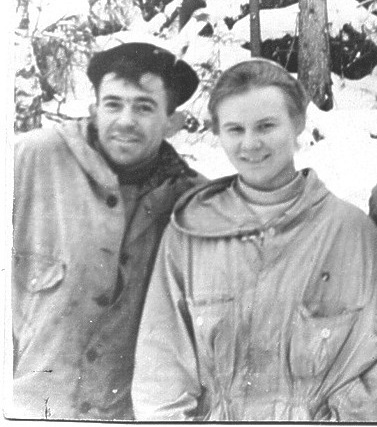
The esteemed professors. Where’s that left hand, pal?
There’s no discussion of what happened on the 25th, the day they arrived in Ivdel, but when the journal picks up in an entry from Citizen Krivonischenko on the 26th they’re singing songs together, and still talking about love, as well as cancer, for some reason. He mentions that they chatted for a long time with some local workers in a hostel, writing “I remembered particularly the red-bearded man. The Beard, that’s what his friends call him.” When you live in Siberia and your friends call you ‘The Beard’, you know you’ve got one hell of a beard. This is the day Yuri leaves the expedition.
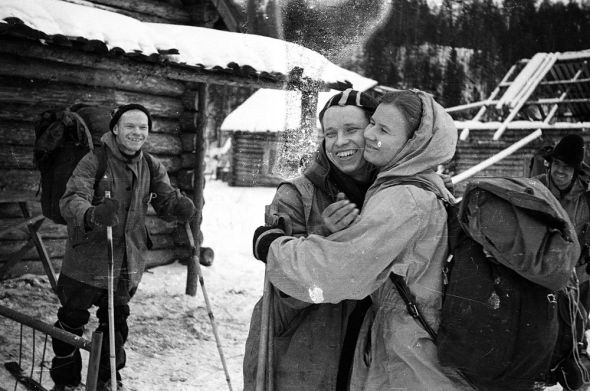
Dubinina hugs Yuri goodbye. Dyatlov is in the background.
They leave Ivdel this day and travel to the ‘41st District’. That night, in a brief, mysterious entry with no apparent point of reference, Nikolai Thibeaux writes “I can’t, although I tried.”
The next day, the 27th, they will be staying in a house in an abandoned village at the edge of the taiga, from which they will launch their assault on Otorten. Yuri Doroshenko writes today’s entry:
Guys started writing down a song. One fellow sang beautifully. We heard a number of illegal songs, that one could go to prison for (article 58 counter-revolutionary crimes). Ognev told Igor how to find the house where we can spend the night. We went there 4 pm.
We started a fire with wood boards. Smoke came [from] the stove. Several people hurt their hands on old nails. Everything is well.
It’s interesting that this appears to be the second time the group has skirted the law with their music. They mention singing songs throughout the diary; is it possible that their ‘counter-revolutionary’ music had put someone on their trail?
The next day, Dubinina mentions that they sing a number of songs around their campfire. They are now on the trail proper. After dinner,
[W]e resume our discussions, mostly about love. Someone comes up with an idea that we need a special notebook for ideas that we might come up with. Conspiring, we started going into the tent two people at a time.
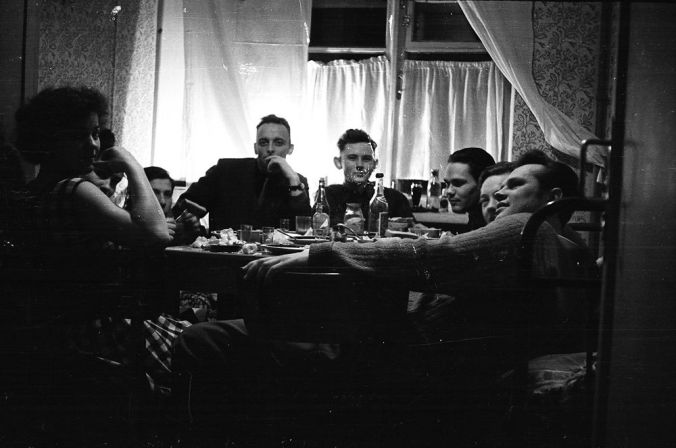
OK, the sexual tension in this group isn’t all in my head, right?
Later that night there is an argument about who should sleep where; the intensely-hot stove hanging from the middle of the tent divides the hikers into two parties, with nobody wanting to sleep in the middle. Krivonischenko tries it, but later moves, “cursing and accusing us of treason.” He goes into another section of the tent, where he and another of the boys have an argument about something else for a while. Dubinina doesn’t say what they were arguing about, which is odd, because she would know, sharing a tent with them.
The next two entries, the last in the journal, seem to be written by Dyatlov, though the first is apparently unsigned. His contribution to the journal is technical and no-nonsense. He is concerned about the weather; it’s not snowing, but a strong wind is blowing snow off the trees in big falls. The river they were supposed to walk on isn’t frozen enough and cannot be traversed; instead they take to a Mansi trail.
In the middle of the road [we saw the] Mansi shed. Yes, Mansi, Mansi, Mansi. This word comes up more and more often in our conversations. Mansi are people of the North. Small Hanti-Mansijskiy nation located in Salehard with 8 thousand population. Very interesting and unique people that inhabit the North Polar Urals, close to the Tyumen region. They have a written language, and leave characteristic signs on forest trees.
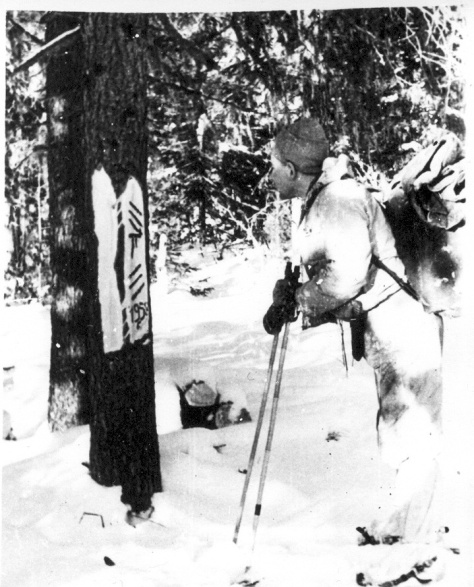
Dyatlov inspects the Mansi markings.
On January 31, Dyatlov comments again about the weather and mentions that they are following the trail of what he presumes is a Mansi deer hunter. They have left the sled trail and are instead apparently following this hunter: “Till now we walk along a Mansi trail, which was crossed by a deer hunter not long ago. Yest[e]rday we apparently came across his resting stop. Deer didn’t go much further. The hunter didn’t follow the beaten trail and we are now in his steps.” He mentions that their visibility is basically zero, and that “sometimes we have to advance gropingly.” Questions here include whether or not Dyatlov was correct about his identification of the Mansi hunter as the one who made the trail. It’s also worth mentioning that if their own visibility was diminished, so would be that of anyone seeing them, which could have caused someone to mistake this hiking party for a threat of some kind.
This is where the journal cuts off. From the reconstructions, we know that they advanced another couple of days. On February 1, they cached some of their gear for the return trip and advanced up the mountain. The disaster, whatever it was, took place that night.
The diary gives us a few ideas to go off of, but we’ll save those for the end, once we’ve seen some more evidence. In the next section we’ll look at the hikers’ large cache of photos from the doomed expedition.